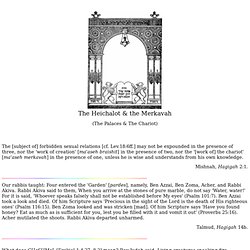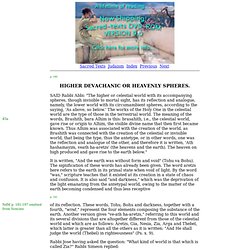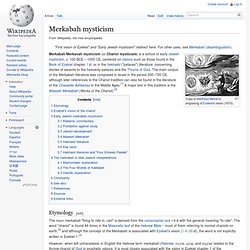

Hermetic Kabbalah. Heichalot. The Heichalot & the Merkavah (The Palaces & The Chariot) The [subject of] forbidden sexual relations [cf.

Lev.18:6ff.] may not be expounded in the presence of three, nor the 'work of creation' [ma'aseh braishit] in the presence of two, nor the '[work of] the chariot' [ma'aseh merkavah] in the presence of one, unless he is wise and understands from his own knowledge. Mishnah, Hagigah 2:1. Our rabbis taught: Four entered the 'Garden' [pardes], namely, Ben Azzai, Ben Zoma, Acher, and Rabbi Akiva. Talmud, Hagigah 14b. What does CHaSHMaL [Ezekiel 1:4,27; 8:2] mean? Talmud, Hagigah 13a-b.
We asked him [Rabbi Ishmael], Who are those who are among those who 'descend to the chariot' and are not among those who 'descend to the chariot'? From Pirkei Heichalot Rabbati (The Greater 'Chapters of the Palaces'), chap.20, 4. ms. published by S.A.Wertheim, in Batei Midrashot (Jerusalem: Mossad HaRav Kook, 1952), v.I, p.98. Rabbi Ishmael said: How beloved is Israel before the Holy, Blessed One! Zohar: Genesis: Chapter XVIII. Higher Devachanic or Heavenly Spheres. Sacred Texts Judaism Index Previous Next p. 180 SAID Rabbi Abbi: "The higher or celestial world with its accompanying spheres, though invisible to mortal sight, has its reflection and analogue, namely, the lower world with its circumambient spheres, according to the saying, 'As above, so below.' The works of the Holy One in the celestial world are the type of those in the terrestrial world.

The meaning of the words,45a Brashith, bara Alhim is this: brasahith, i.e., the celestial world, gave rise or origin to Alhim, the visible divine name that then first became known. Thus Alhim was associated with the creation of the world, as Brashith was connected with the creation of the celestial or invisible world, that being the type, thus the antetype, or in other words, one was the reflection and analogue of the other, and therefore it is written, 'Ath hashamayim, veath ha-aretzs' (the heavens and the earth).
It is written, "And the earth was without form and void" (Tohu va Bohu). P. 181 p. 182. The hidden and manifest God: some ... - Peter Schäfer. Mmhie. Merkabah. Etymology[edit] The noun merkabah "thing to ride in, cart" is derived from the consonantal root r-k-b with the general meaning "to ride".

The word "chariot" is found 44 times in the Masoretic text of the Hebrew Bible – most of them referring to normal chariots on earth,[3] and although the concept of the Merkabah is associated with Ezekiel's vision (1:4–26), the word is not explicitly written in Ezekiel 1.[4] Ezekiel's vision of the chariot[edit] Ezekiel's Wheel in St. John the Baptist Church in Kratovo, Macedonia. According to the verses in Ezekiel and its attendant commentaries, his vision consists of a chariot made of many heavenly beings driven by the "Likeness of a Man. " The Bible later makes mention of a third type of angel found in the Merkabah called "Seraphim" (lit. Early Jewish merkabah mysticism[edit] [edit] Prohibition against study[edit] The Talmudic interdictions concerning merkabah speculation are numerous and widely held. Jewish development[edit] Maaseh Merkabah[edit]